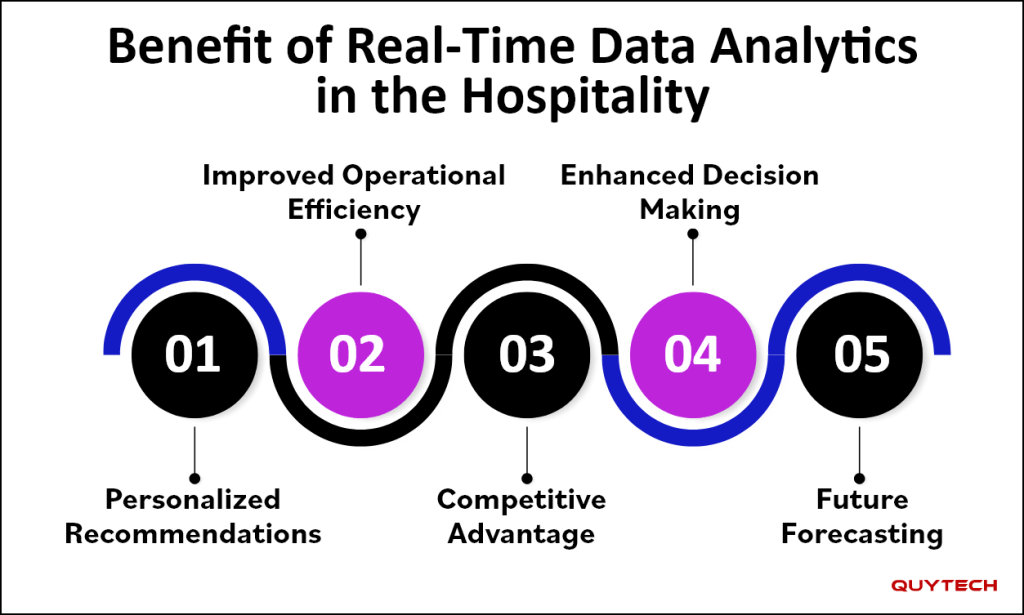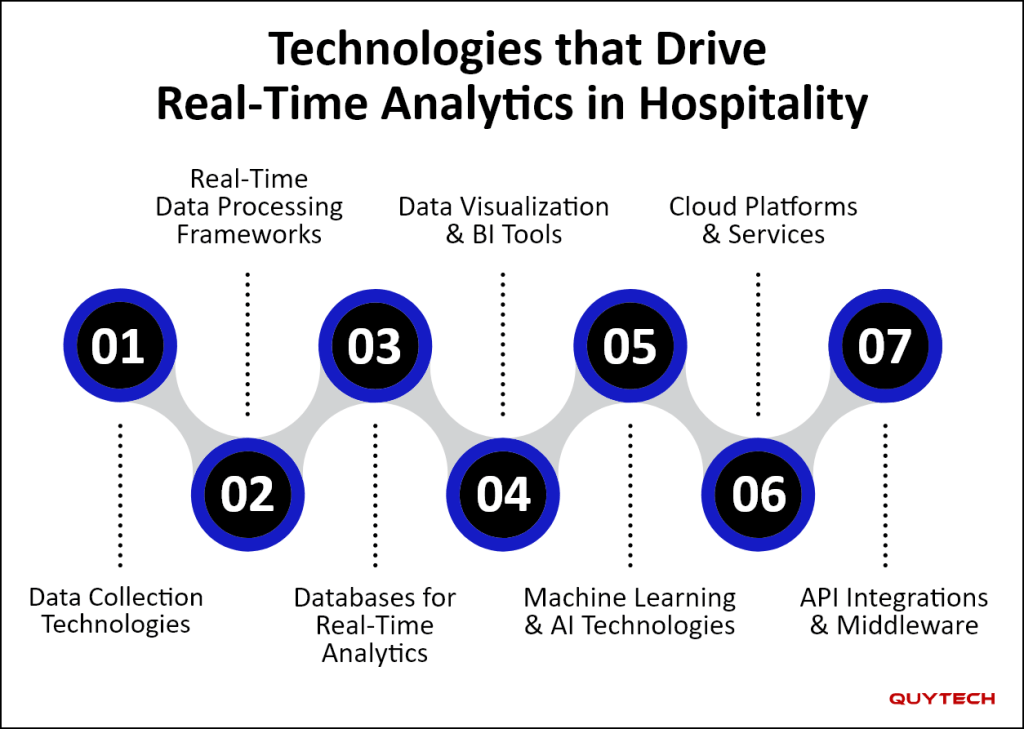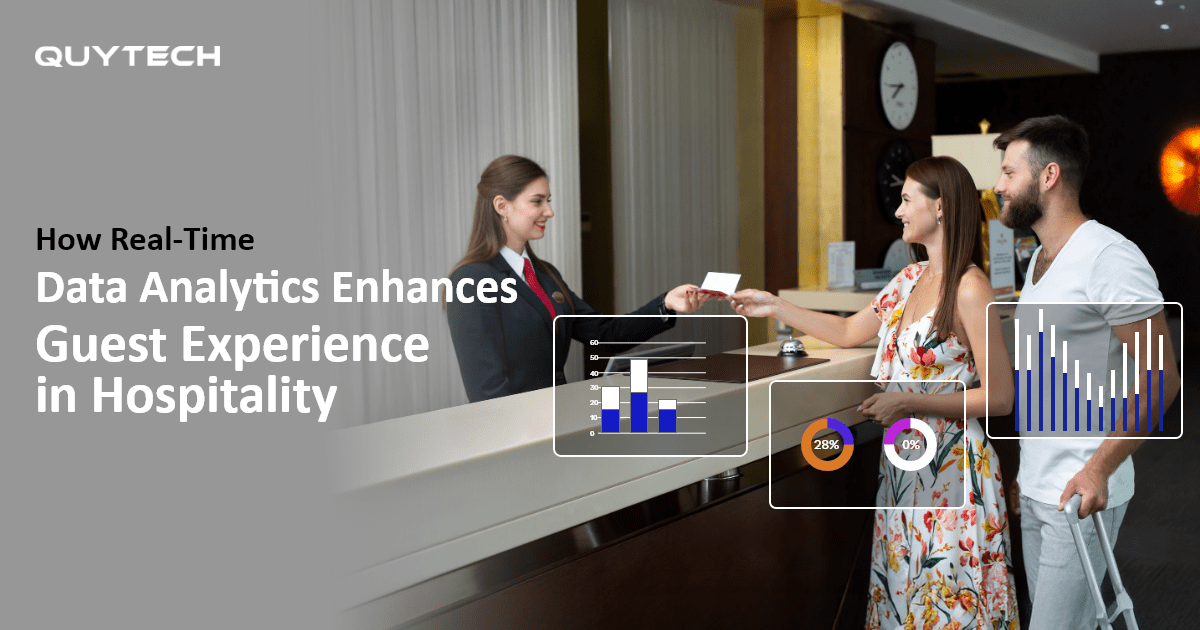In an industry like hospitality, where guests are the heart of every service offered, their experience plays a prominent role. Relying on traditional methods to cater to evolving expectations is often ineffective and impacts the business in terms of time, money, and effort. In today’s time, when every suggestion to improve guest experience is made based on the guests’ preferences, adapting the right tools and implementing real-time data analytics is a necessity.
But why exactly AI data analytics? Well, real-time data analytics in hospitality does more than simply utilizing historical data on booking histories and feedback. It counts every live interaction a guest experiences, be it on web portals or in real life.
Curious to know more about it? This blog answers your curiosity about how real-time data analytics empowers the hospitality industry to deliver faster, smarter, and more memorable guest experiences.
Market stats
- According to the report by Verified Market Reports, the market for real-time analytics is expanding remarkably. It is expected to increase from its 2024 valuation of USD 10.9 billion to USD 28.7 billion by 2033. This expansion is projected to exhibit a robust 11.2% CAGR from 2026 to 2033.
- The report highlights that with over 38% of the worldwide market value, North America is driving the real-time analytics revolution.
- The same report also highlights that, with a projected compound annual growth rate of 12.5% through 2028, the Asia Pacific is the region with the fastest rate of growth. It currently accounts for about 30% of the total share.
What is Real-Time Data Analytics in Hospitality?
Similar to data analytics, real-time analytics also involves collecting, analyzing, and providing insights based on the data. However, real-time analytics emphasizes performing all these functions in real-time. Unlike data analytics, it operates on historical data, and it acts proactively by offering insights and suggestions as events occur.
In hospitality, real-time data analytics is all about knowing what your guests want and catering to them proactively. It is about offering personalization in a manner that makes them feel welcome and at home.
While the difference might not look significant, from a guest’s perspective, it is significant enough to enhance their interactions and experiences. Providing services in the way guests expect can result in better retention and guest loyalty.
How Does Real-Time Data Analytics Benefit the Hospitality Industry
Real-time data analytics benefits the hospitality industry in numerous ways that enhance guest experience as well as business decision-making. The following are the core benefits of real-time data analytics in hospitality industry:

Personalized Recommendations
Real-time data analytics allows hospitality businesses to offer personalized recommendations to guests. It utilizes the current as well as historical data to understand preferences and customize its services based on them. This includes giving deals and offers like spa treatment discounts, lounge benefits, restaurant suggestions, etc.
Improved Operational Efficiency
Real-time data analytics utilizes dynamic pricing strategies for better revenue generation. It automates repetitive tasks and deploys the staff to higher-level tasks. Apart from this, real-time analytics helps in managing the inventory levels and facilitates predictive maintenance to reduce unexpected downtime and idleness.
Competitive Advantage
In hospitality, real-time analytics enables businesses to be adaptive to the dynamic market environment. It helps businesses in creating trend-targeting marketing campaigns. Along with this, it enables real-time feedback systems to gain guests’ perspectives for improvement thereafter.
Enhanced Decision Making
With the help of historical and real-time data, the executives can make strategic decisions towards improving the guest experience. Real-time data analytics in hospitality assists in providing insights based on data evidence. It enhances the quality of the decision-making process.
Future Forecasting
When real-time and historical data are analyzed, they reveal trends and patterns of the hospitality industry. With the help of these, hospitality businesses can forecast future possible outcomes. This not only helps in forming better strategies but also helps businesses in taking proactive actions.
Read More: Data Analytics in Manufacturing: Simplifying the Data with AI
What are the Technologies that Drive Real-Time Analytics in Hospitality
Just like any other technological advancement, real-time data analytics also utilizes some technologies that run it smoothly. These are:

1. Data Collection Technologies
- Internet of Things Sensors and Devices: These sensors are used to know real-time usage data of lights, elevators, etc.
- Point of Sale System: Used to analyze the spending patterns of the guests in spas, restaurants, etc.
- Property Management System: helps in tracing bookings, check-ins, guest profiles, etc.
- Mobile Apps and WiFi Analytics: assist in gathering behavioral data to understand the habits and location-based preferences of guests.
- Social Media Tools: help in sentiment analysis of the guests to track guest satisfaction trends.
2. Real-Time Data Processing Frameworks
- Apache Kafka: Supports real-time collection and processing of large datasets as well as data streaming pipelines.
- Apache Flink/ Apache Spark Streaming: Used for real-time incoming data computation and analysis, allowing for immediate action and decision making.
- StreamSets/NiFi: Provide low-code solutions for real-time data ingestion, processing, and cross-system integration.
3. Databases for Real-Time Analytics
- Time Series Databases: Track room temperature, occupancy rates, or energy use over a period with the help of time-series databases like InfluxDB or Timescale DB.
- In-memory Databases: For immediate reports, in-memory databases like Redis and MemSQL provide quick access and real-time analytics.
- Cloud-Based Data Warehouses: Large amounts of structured and semi-structured data are stored in cloud-based data warehouses (like Snowflake, Google BigQuery, and Amazon Redshift) for quick querying and analysis.
4. Data Visualization & BI Tools
- Tableau/ Power BI/ Looker: Analysts use it to build real-time dashboards. These dashboards show revenue per room (RevPAR), occupancy rates, and guest satisfaction.
- SuperSet/ Metabase: Open-source tools for dashboarding and real-time visual analytics.
5. Machine Learning & AI Technologies
- Python Libraries: Analysts can create models for demand forecasting, churn prediction, dynamic pricing, and personalisation. They do this with the aid of Python libraries (Pandas, scikit-learn, TensorFlow, and PyTorch).
- ML Platform: Real-time ML models linked with guest-facing applications can be deployed thanks to ML platforms like DataRobot, Amazon SageMaker, and Google Vertex AI.
6. Cloud Platforms & Services
- Azure, Google Cloud, and AWS: these facilitate real-time analytics pipelines, provide integrated services such as stream processing, machine learning, and real-time databases.
- AWS/Firebase AppSync: used by mobile apps to track guest interactions in real time.
7. API Integrations & Middleware
- RESTful APIs / GraphQL APIs: Make it easier for systems such as third-party booking engines, CRM, and PMS to communicate data.
- ETL Tools (e.g., Talend, Fivetran, Airbyte): Streamline and automate the transfer of data to analytics environments from many sources.
Read More: Data Analytics in Telecom Industry – Top Use Cases
How Quytech Helps with the Implementation of Real-Time Hospitality Analytics
With over 14 years of market presence and industry experience, Quytech helps in delivering real-time data analytics solutions that track the happenings in real-time. Our team of talented and skilled developers works closely with you and builds tailored solutions for your hospitality business.
Our successful analytics projects, like PRAAVI HRMS, where our team developed an HR analytics software, highlight our commitment towards building scalable and customized solutions. Another example of our versatility in different industries is the predictive tyre maintenance and analytics solution that provides real-time alerts, predictive failure analytics, and a performance monitoring system that helps overcome inefficient tyre maintenance practices, unexpected failures and breakdowns, and operational delays. Quytech excels in delivering effective solutions for every domain.
Conclusion
As the guest demands evolve constantly, industries like hospitality need a makeover. To aid this makeover, shifting to real-time analytics solutions is a smart move. Real-time data analytics, when integrated with the hospitality industry, gives a personalized experience to the guests.
The personalization is done with the help of data collected from the activities be it online or offline. This data helps in knowing the guests better and offering suggestions and offers to them based on their liking.
Adopting real-time data analytics not only enhances the guest experience but also helps the business prosper by improving operational efficiency, decision-making, future forecasting, etc. Utilizing real-time analytics helps businesses react proactively to future outcomes and gain a competitive advantage.
FAQ’s
No, real-time data analytics is useful for small and medium-sized hospitality businesses as well. It helps in improving guest experience and contributes to improving other business operations too.
Yes, when you partner with experts to build real-time data analytics solutions, they ensure that the solution follows required data security regulations.
No, real-time data analytics uses digital as well as non-digital guest data to perform its functions. It refers to activities on websites, apps, online portals, offline interactions, suggestions, etc.
Apart from enhancing the guest experience, real-time analytics helps in identifying the performance of different operational areas and gives insights to enhance their effectiveness. It also helps in making data-driven decisions



